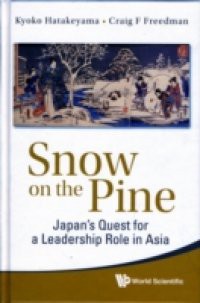Snow on the Pine presents a compelling view of the Japanese foreign policy that runs counter to the common wisdom reducing Japan's post-war efforts to the pursuit of purely commercial interests. This book takes a new approach — the eventual Japanese defeat in the Second World War did not transform Japan into an “exceptional state” seeking only economic interests. Like any other nations, economic issues have always played a crucial role in policy decisions. However, this is but only one amongst the many interweaving threads determining foreign policy decisions.In the authors' eyes, Japan's foreign policy is characterized by the drive to dominate and influence the East Asia region, which has been a consistent motivation since the days of the Meiji restoration. Thus, the post-war period in this analysis provides a continuation rather than a break with the country's previous history. Tactics, and even strategies, may have changed over time to meet the challenges of the ever evolving economic and political environments but the overall objective has essentially remained constant. The snow melts, but the pine endures.Contents:Unpacking Japanese Foreign Policy: The Case Against Conventional WisdomA Modern Historical Background:Tumultuous Japan: Regional Diplomacy: 1868–1965A Junior Partner: Japanese Entanglements with the United States and Asia 1965–1980Rising Power: Japan Attempts to Recapture Its Traditional Role in the 1980sThe 1990s — Case Studies in Diplomacy:Becoming a Full-Fledged Power in the 1990s: The Purpose Behind Peacekeeping OperationsMore Peacekeeping Operations: The Case of East TimorHampered Diplomacy: Japanese Overtures to North KoreaUsing Economic Diplomacy: Japan and the Asian MeltdownIntellectual Leadership: Japan's Relationship with VietnamThe Consequences of Japanese DiplomacyThe Economic and Political Context of Japanese Foreign Policy:Tatemae and Honne: Understanding the Post-War Japanese EconomyThe Long Arm of the Japanese Economy: The Role of Foreign Direct Investment in Post-War JapanReadership: Academics in the fields of political science, international relations, Japanese Studies, political economy; graduate and undergraduate students.

